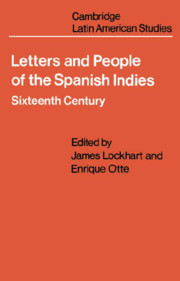Book contents
- Frontmatter
- Contents
- Preface
- Part I Conquest
- Part II The Variety of Life in the Indies
- Part III officials and Clerics
- 29 How a governor operates
- 30 Alarm and drastic remedies: A viceroy's view of New Spain
- 31 The concerns of a judge
- 32 bishop and the governor
- 33 A bishop's affairs
- 34 Franciscans and the Indians
- 35 The Dominican attack
- 36 The Franciscan reply
- 37 The petty administrator
- 38 The parish priest
- Bibliography
- Index
37 - The petty administrator
from Part III - officials and Clerics
Published online by Cambridge University Press: 06 August 2018
- Frontmatter
- Contents
- Preface
- Part I Conquest
- Part II The Variety of Life in the Indies
- Part III officials and Clerics
- 29 How a governor operates
- 30 Alarm and drastic remedies: A viceroy's view of New Spain
- 31 The concerns of a judge
- 32 bishop and the governor
- 33 A bishop's affairs
- 34 Franciscans and the Indians
- 35 The Dominican attack
- 36 The Franciscan reply
- 37 The petty administrator
- 38 The parish priest
- Bibliography
- Index
Summary
Bartolome Perez Guillermo, deputy governor of Zinapecuaro, Mexico, to his nephew Gregorio Sanchez de Moscoso in Calzadilla de los Barros, Extremadura, 1577
… and the main thing is, she comes of very important parents …
We conclude Part III with two letters from lower members of the governmental and ecclesiastic hierarchies. The writers seem more immersed in the society and economy of their immediate surroundings than in their respective organizations, and they reveal themselves in most aspects as settlers like any others. In both cases the famous nephew in Spain is a central figure, as so often in the messages of settlers in Part II: in this letter, soon to arrive; in the next, fervently hoped for.
Not only did the encomenderos have to learn to share the economic exploitation of their districts with other Spaniards, they also soon saw their informal jurisdictional-administrative dominance there challenged by representatives of the civil administration entering the countryside. Sooner in some areas, later in others, but eventually almost everywhere, there came to be officials stationed outside the Spanish cities, appointed for short terms, to administer justice locally and collect royal trib utes from the gradually increasing number of Indian towns which were placed directly under the crown rather than in encomiendas. With various titles, from the resounding corregidor, through alcalde mayor, perhaps the most common term, to the more modest teniente (de gobemador) as in the present case, these administrators had their seats in the largest Indian towns of jurisdictions containing on the order of five encomiendas or so. Though among the lowest direct appointees of viceroys or governors, they did have staffs, consisting of some constables, secretaries and retainers.
Like the estates of the non-encomenderos, the institution of the alcalde mayor was a manifestation of the thickening Spanish web, a congeries of interests and counterinterests no longer so easily dominated by a few individuals. And just as the encomenderos found advantages in the economic invasion of their territories, and long retained a more subtle kind of dominance, so they did in the sphere of rural government. Part of the pressure to appoint alcaldes mayores came from the old need of the governors for patronage, for meaningful posts to give the followers they brought from Spain. Corresponding pressure existed on the part of the encomendero families, a quickly multiplying group.
- Type
- Chapter
- Information
- Letters and People of the Spanish IndiesSixteenth Century, pp. 247 - 252Publisher: Cambridge University PressPrint publication year: 1976



